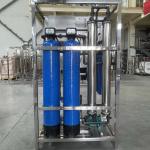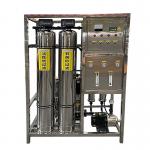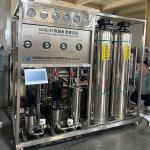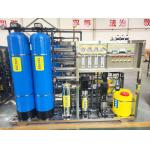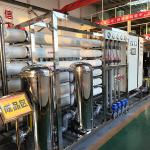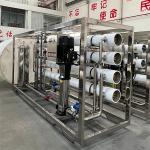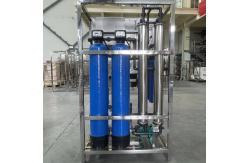0.5T Unipolar Reverse Osmosis Water Treatment System For Industrial
Use
Product Description
This product is a 0.5 ton single pole reverse osmosis water
treatment equipment, using advanced reverse osmosis technology,
designed specifically for small and medium-sized water treatment
needs. This equipment can effectively remove impurities such as
dissolved salts, organic matter, microorganisms, bacteria, etc.
from water, providing high-purity and high-quality water.
Parameter Table
Model | Water Making Ability | Inlet Caliber | Effluent Caliber | Blowdown alCer | Size(mm) | Power |
YSRO-0.5T | 0.5m3/h | DN20 | DN20 | DN15 | 1500×600×1500 | 1.3kw |
YSRO-1T | 1m3/h | DN25 | DN25 | DN20 | 1700×600×1500 | 2.1kw |
YSRO-2T | 2m3/h | DN32 | DN25 | DN20 | 2500×1000×1950 | 4.4kw |
YSRO-3T | 3m3/h | DN40 | DN32 | DN25 | 2500×1200×2150 | 4.5kw |
YSRO-5T | 5m3/h | DN50 | DN40 | DN32 | 2500×1350×2150 | 7.0kw |
YSRO-8T | 8m3/h | DN50 | DN50 | DN40 | 3500×1500×2150 | 11kw |
YSRO-10T | 10m3/h | DN50 | DN50 | DN40 | 3500×1600×2300 | 15kw |
Key Advantage
1. High processing efficiency
Single stage reverse osmosis design, fully utilizing water pressure
potential energy to improve water treatment efficiency. The
equipment produces a large amount of water per unit time, meeting
the demand for rapid water use.
2. High effluent quality
By using high-precision reverse osmosis membrane filtration,
soluble salts, organic matter, heavy metal ions, etc. in water are
effectively removed, ensuring that the effluent quality meets high
standard requirements.
3. Low operating costs
The equipment adopts energy-saving design to reduce energy
consumption and operating costs. At the same time, the reverse
osmosis membrane has a long lifespan, a long replacement cycle, and
reduces maintenance costs.
Maintenance
1. Cleaning: Regularly perform chemical cleaning on the reverse osmosis
membrane based on the inlet water quality and operating conditions.
Generally, it should be cleaned every 3-6 months. If the incoming
water quality is poor or the membrane components are severely
contaminated, the cleaning cycle should be shortened. Choose
appropriate cleaning agents, such as acidic cleaning agents for
removing carbonate scale, metal oxides, etc., and alkaline cleaning
agents for removing organic matter, microorganisms, and other
pollutants. The cleaning process is strictly carried out in
accordance with the operating procedures to avoid damaging the
membrane components due to improper operation.
2. Storage: When the equipment is shut down for a long time (more than 7
days), the reverse osmosis membrane needs to be protected. Fill the
membrane element with chemical agents to prevent microbial growth
and dehydration of the membrane element. The commonly used
protective solution is a 1% sodium bisulfite solution. During
storage, regularly check the concentration and pH value of the
protective solution to ensure its effectiveness. Before restarting
the device, rinse the protective solution thoroughly with clean
water.
3. Replacement: Reverse osmosis membranes have a certain service life, usually 3-5
years. When the desalination rate of the membrane element drops to
85% -90% of the initial value, or the water production rate drops
to 70% -80% of the initial value, and cannot be restored through
chemical cleaning, the membrane element needs to be replaced in a
timely manner to ensure the quality of the water production and the
normal operation of the equipment.
Product Display
